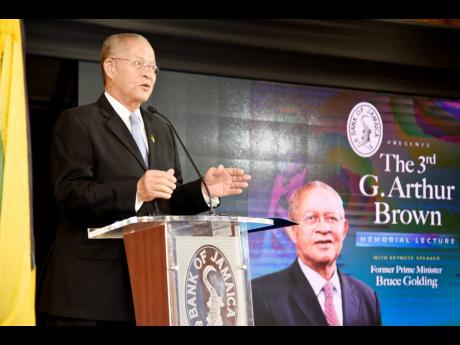Golding: Education in chronic state of alarm
Former PM laments bleak prospects for thousands without ‘bare minimum’ in CSEC passes
Former Prime Minister Bruce Golding believes that having pumped more than $500 billion into the education sector in the last two decades to boost outcomes, the country has not received bang for its buck.
“What has caused our dismal performance in educating our children?” Golding asked during his presentation at the G. Arthur Brown Memorial Lecture at the Bank of Jamaica Auditorium in downtown Kingston on Thursday.
“This year, we’re spending $122 billion on education ... Of that, around $70 billion, [or] 60 per cent, is allocated to our primary and secondary schools,” Golding said.
He noted that the findings and recommendations of the Orlando Patterson-led Jamaica Education Transformation Commission 2021 report released in January are not much different from those of the Dr Rae Davis-led task force of 2004.
“More than $500 billion dollars of expenditure later – and I’m talking about primary and secondary, not complete education – the results from our primary schools are as shameful as Orlando Patterson and his team found,” the former prime minister said.
“There are many things that we need to get right to complement the macroeconomic stability that we seem to have finally grasped if we are to achieve the annual growth rate of four and five per cent that has eluded us for more than 30 years,” he added.
“Is it that we have not allocated sufficient resources?”
Don’t repeat mistakes
Golding said that for Jamaica to see marked improvement in the performance of students, mistakes made at several levels should not be repeated. These mistakes, he suggested, could be corrected if the recommendations of the 2021 Jamaica Education Transformation Commission report are implemented.
On the other hand, Golding said Jamaica has made good headway in terms of infrastructure and communications with the enabling legislative and regulatory framework is in place.
“The bureaucracy has improved significantly, although we still have some way to go. It is in the area of education and training that we have fallen down. No, not fallen down. We have failed miserably. Our education system is in a state of chronic – to borrow Ezroy Millwood’s colourful expression – alarm,” Golding said, referencing the former head of the National Transport Cooperative Society who died a decade ago.
Golding believes that the way in which schools are operated should be changed in order to boost student performance.
He expressed concern that many students leave primary schools illiterate each year, and of the roughly 41,000 students leaving secondary schools, less than 16 per cent obtain five or more CSEC passes, including maths and English.
CSEC – the Caribbean Secondary Education Certificate examinations – is administered by the Caribbean Examinations Council.
The former prime minister reasoned that these results do not augur well for the current generation between the ages of 20 and 40 years, which numbers approximately 900,000 and accounts for about 70 per cent of the labour force.
“Of that 900,000, approximately 650,000 of them left school without the bare minimum of five passes, including maths and English. How are they going to find a place in a fast-changing world where any job – whether operating a complex piece of equipment or dealing with waste management – will require critical thinking and problem solving?” he asked.
Golding said more than 30 years ago, G. Arthur Brown – in whose honour the memorial lecture is named – spoke of the increasing use of robots to displace unskilled labour, and now, email and WhatsApp, downloads and print have all but made the office messenger redundant.
Additionally, he noted, artificial intelligence is now threatening the job of even some skilled workers.

